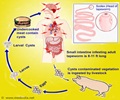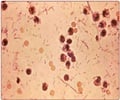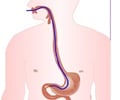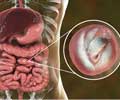Tapeworm Infections - Glossary
Anus: It is the posterior opening of the large bowel. It is the outlet of the rectum, through which fecal waste passes
Anti-parasitic: Drugs used to treat bacterial and parasitic infections and some cancers.
Anti-Inflammatory: Having to do with reducing inflammation.
Anorexia: An abnormal loss of the appetite for food. Anorexia can be caused by cancer, AIDS, a mental disorder (i.e., anorexia nervosa), or other diseases.
Asymptomatic: Having no signs or symptoms of disease.
CT scan: Also called computerized axial tomography (CAT); a scanning method that uses computerized x-ray images to provide a three-dimensional picture of an internal part of the body.
Cyst: A sac or capsule filled with fluid.
Feces: Body waste discharged from the bowels; stool.
Infection: Invasion of the body by agents (bacteria, viruses or fungi) that cause disease or tissue damage.
Laxative: Stimulates bowel movements.
Nausea: Nausea is the urge to vomit. It can be brought by many causes including, systemic illnesses, such as influenza, medications, pain, and inner ear disease.
Parasite: An organism that lives on or within another organism at the expense of the host.
Pernicious Anemia: A type of anemia (low red blood cell count) caused by the body's inability to absorb vitamin B12.
Retina: Light-sensitive layer of tissue located at the back of the eye that transmits visual images to the brain.
Seizures: Convulsions; sudden, involuntary movements of the muscles.
Stool Test: A test to check for hidden blood in the bowel movement.












